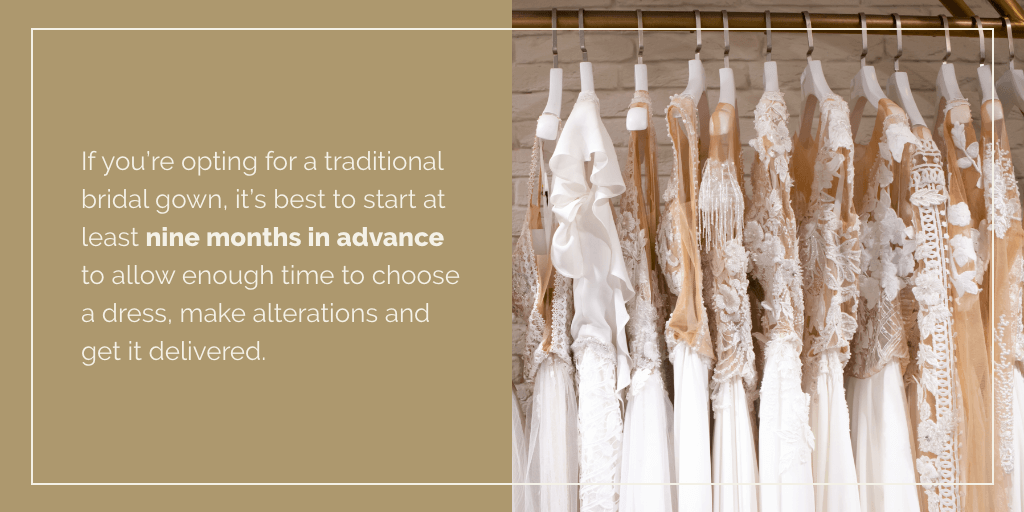Knowing where to start when planning a wedding can be overwhelming. That’s why we’ve put together this wedding planning guide to help you get started on planning your special day.
10 Steps to Planning a Wedding
With so many components to consider, wedding planning can feel like a massive task. Luckily, while every wedding is unique, the steps to planning a wedding are universal.
1. Set Your Budget
Before you take any other steps in planning your wedding, set a realistic budget. Analyze your finances to see what you have saved and how much you can realistically spend. If possible, discuss with your parents and other family members if they would be willing to contribute to the day.
2. Get Organized
Whether you hire a wedding planner or take the reins yourself, having a wedding planning book or journal will help you stay organized. You can use it to create a master checklist of everything you need to do — having one place to keep all your ideas will help you stick to your budget and timeline.
It’s also a good idea to set up a wedding website to keep track of RSVPs. Add a link to your invites for people to respond and fill out crucial information such as dietary requirements. You’ll have all the information in one place, eliminating the need to comb through emails, messages and paper responses. You can also have your website double as a wedding registry to make things even easier!
3. Choose a Style and Theme
Decide what kind of style and theme you want for your wedding. Take a look through wedding tags on Instagram, or create a Pinterest board of all your favorite ideas. A few common wedding themes include:
- Rustic
- Romantic
- Garden
- Modern
- Bohemian
- Classic
Choosing a theme will make it easier to make aesthetic choices for your invitations, flowers, clothing, accessories and other elements of your wedding. Create a mood board that you and your partner can access to help you both visualize your theme and style, keeping you aligned.
4. Pick a Date
You don’t need a specific date right away — selecting a month or even a season is enough. Do you want a winter or summer wedding? Do you see yourself walking down the aisle in autumn or in spring? Once you pick a season, choose a few possible dates.
Venues often fill up well in advance or may offer packages for particular days. You can narrow down a specific day as you get closer to your chosen season, depending on the venue availability.
5. Create a Guest List
Settling on a guest list can be one of the most challenging parts of planning a wedding. The size of your guest list will depend on your venue and budget.
Start by deciding how many people you want at your wedding, then list everyone you and your partner want there and compare the numbers. For example, if you’ve decided on 120 people and your list has 200, you’ll need to make adjustments.
One way to keep your guest list in check is by separating it into different levels. The highest level will be for your dealbreakers like parents, family, close friends and your wedding party. The next level should include the people you want at your wedding but might be willing to cut if necessary. The final level will be for anyone you’ll only invite if someone in the two higher levels can’t make it.
6. Pick Your Wedding Party
Choosing who will stand with you and your partner on your special day is an emotional task. Take the time with your partner to discuss how big you want your wedding party to be and who will be in it. Remember, being part of a wedding party comes with specific responsibilities, so make sure that the people you choose can fulfill those responsibilities properly.
7. Choose Your Attire
Shopping for your wedding outfit can be a ton of fun, but it also requires some serious planning:
- If you’re opting for a traditional bridal gown, it’s best to start at least nine months in advance to allow enough time to choose a dress, make alterations and get it delivered.
- For matching wedding party dresses, you’ll want to start shopping shortly after getting your wedding dress.
- Suit shopping can typically start about five months before the wedding.

Depending on your style and theme, you might want your wedding party to wear specific jewelry or other embellishments. Searching early for these extras will give you plenty of time to find them before the wedding.
8. Choose Your Venue and Vendors
Your choice of venue will impact nearly every other decision, from the guestlist to suppliers to the date you choose. Research all the possibilities and determine the best options for your wedding. Many venues will offer various wedding packages with different options for catering and vendors. Others might have different venues on the property for you to choose from.
Once you’ve chosen a venue and set a date, you’ll need to start looking for your wedding vendors to handle tasks like:
- Music
- Photography and videography
- Caterering and serving
- Flowers
- Hair and makeup
- Transportation
Book as early as possible if you’re set on a specific vendor or venue to guarantee they are available. However, you may need to be flexible with your venue and vendors — many places are booked well in advance, so you might have to move your date around or consider other venues.
9. Find an Officiant
Choosing who you want to preside over your wedding is a significant part of your wedding planning. Your officiant will usher you and your partner into the rest of your lives. Be sure to choose someone who shares your values and spiritual beliefs.
10. Make It Legal
Different states will have a clear set of requirements for a wedding license, including how long it’s valid and when you’ll need to file it. Check with your city or town clerk if you’re unsure of your local requirements.
Wedding Planning Tips
Planning a wedding can be a surprising amount of work! We’ve collected some wedding planning advice and ideas to help ease your way:
- Plan for the unexpected: Decide early on how far over budget you are willing to go if you run into unexpected expenses.
- Start on the same page: Make a list of likes and dislikes with your partner, so you have a starting point for inspiration.
- Be upfront in your invitations: Be clear early on about whether you will allow children and plus-ones.
- Keep your wedding party informed: Have an honest discussion with your wedding party about possible expenses and duties they will need to perform. This way, they can pull out or make arrangements as required.
- Consider a wedding package: The advantages of venues with on-site accommodations or existing catering expertise can help make your planning easier.
Choose Hancock Hotel for Your Wedding
At Hancock Hotel, we know how important your wedding day is. As a AAA Four Diamond Hotel, we offer a range of premium wedding services, including an exclusive wedding caterer. Choose from our range of wedding packages that we’ve specifically designed to help you plan your dream wedding.
Contact us online to talk to our experienced in-house wedding coordinator today!
